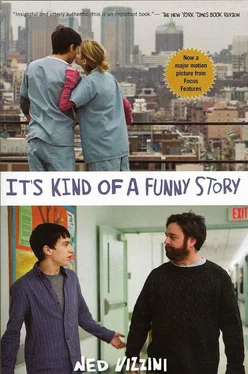I take the Xeroxed form that’s handed to me. It asks my birthdate and address, my parents’ names and phone numbers, my health insurance. I don’t know much about health insurance, but I know that my Social Security number is my ID number, so I put that down. I feel kind of good filling out the form, like I’m applying to a special academy.
I put the form, completed, in a small black tray hanging off the side of the registration desk. There’s only one piece of paper in front of mine; I sit back down next to Peanut Man. I stare at the floor; it’s made up of foot-long tiles in red and white, like a chessboard, and I imagine how a knight would move across it. I’m so crazy. I’ve lost it. This isn’t going to help. I should leave. Is it too late? My bike is back at home in my hallway. I can do it. I’m strong enough.
“Craig?” a woman pops her head out from a door at the end of Registration.
I stand up. The Hispanic couple howls that they were here first and someone comes out to talk to them in Spanish. Sorry, people.
“Come,” she beckons. “I’m the nurse.”
I shake her hand.
“Have a seat.” I enter her long, thin chamber, which has a computer and two chairs and an array of tubes and robes on hooks on the wall. The sun is rising through a window at the end of the room. Across from me is a poster about domestic violence: If your man beats you, forces you to have sex, controls your money, or threatens you about immigration papers, you are a victim!
The nurse—short with curly hair and a clownish face—reaches to the hooks behind her and unfurls a blood pressure gauge. I always liked these. Not that they’re pleasant, but they always feel like they could be so much worse. She attaches it to some readout device and pumps me up.
“So what’s wrong, ishkabibbles?” she asks.
Ishkabibbles? I give her the rap.
“Did you do anything to yourself? Did you try and cut yourself; did you try and hurt yourself; did you actually go anywhere?”
“No. I called 1-800-SUICIDE and they sent me here.”
“Good. Wonderful. You did the right thing. They’re so great.”
She unwraps me, turns, and types information into the computer. She reads off my sheet in a tray to the right of the monitor, where I wrote “want to kill myself” as my reason for admission.
“Now, were you on medicine?”
“Zoloft. I stopped taking it.”
“You stopped?” She opens her eyes wide. “We get that a lot.” She types. “You really can’t do that.”
“I know.” I’m glad I have a concrete thing to blame this on, something everyone can point a finger at.
“You really have to stop, right now, and think about how you feel. I want you to remember how you feel the next time you decide to stop taking your medicine.”
“Okay.” I commit it to memory; I feel dead, wasted, awful, broken, and useless. It’s not the kind of feeling you forget.
“You’re going to be fine, ishkabibbles,” she says.
I look at what she’s typing on the screen. Under “reason for admission,” she puts SUICIDAL IDEATION.
That would be a good band name, I think.
“Come on,” she says, getting up from the computer. Behind it, a printer is producing something, whining and clicking. She reaches back and pulls two stickers out, puts them on plastic bracelets that she has attached to her belt, which is like a nurse utility belt, and affixes them to my right wrist.
I look down. They both say Craig Gilner, and have my Social Security number and a bar code on them.
“Why do I get two?” I ask.
“Because you’re too special.”
She leads me out of the room into the ER proper, past curtains that are alternately drawn and undrawn to show the cast of characters here on an early Saturday morning. The vast majority are old people—specifically, old white women with tubes in them, yelling and moaning. What they’re yelling for is water— “Waaa-taaa, waaa-taa” —and what they’re getting is totally ignored. Doctors—I think the doctors are in white coats and the nurses are in blue, right?—stride by holding clipboards. One has a young scruffy blond beard that I would never expect to see on a doctor—his name is Dr. Kepler. It says RESIDENT, so he’s a college guy. That’s one of the things I could be someday if I hadn’t messed up and gotten myself in here.
“This way,” the nurse says.
Beeping serenades us. It’s coming from every where, a dozen different kind of beeps—loud ones, scary ones, ding-y ones, random ones. I wonder if they ever sync up as we pass by two giant metal racks on wheels—inside are pale yellow trays wrapped in plastic. Hospital breakfast. A nurse pushes them through a door marked FOOD PREP.
We move by a group of Hispanic guys lounging on stretchers who all look like they were in the same bar fight. One has a bandage on his face, one is pointing to his chest for a doctor, and one is rolling up his pants to show off what looks like a shark bite. The doctor hisses at him in Spanish, and he rolls his pants back down. We go by a bank of computers and there the nurse tells me to wait—she flags down an Indian doctor, and he takes a stretcher, which up close looks like a very complicated and expensive piece of machinery, with red and black levers sticking out everywhere, into a side room marked “22.”
Room 22 is just big enough to accommodate the stretcher. It doesn’t have a door, just a doorway. The walls are yellow. The nurse leads me in there.
“A doctor will be with you shortly,” she says.
It’s bright. Bright as hell. And I haven’t slept. I sit on the stretcher. What am I supposed to do in here? There’s nothing to do. There aren’t even any hooks.
Outside of 22, a black guy with long dreads is on a stretcher next to a curtain. He’s well dressed in dark brown—with black shoes like mine—and he’s holding his hip and writhing in pain. It’s something I’ve never seen except in movies—a man clutching himself and grimacing and swaying and breathing in little huffs and bearing his teeth and going “Nurse, nurse, please.” It looks like he’s dislocated his hip. He rolls over on his side and then back on his back, but nothing seems to help.
Who’s worse, soldier, you or him?
Dunno, sir!
It’s a trick question, soldier.
Well, him, obviously. I mean I’m sitting here loung-ing; he’s practically dying out there.
I expected more from you, son.
How?
You’re a smart kid. You should be able to see when somebody’s faking. And soldier —
Yes.
— Good job out there. I’m glad you’re still on board.
I don’t feel any better.
Life’s not about feeling better; it’s about getting the job done.
I look again at the black guy; as I do, a big police officer with closely cropped hair and those weird little fat bumps on the back of his neck saunters onto the scene with a newspaper and a cup of coffee. He takes an orange plastic seat and sits down right outside from me, between Room 22 and Room 21, another open-style, closet-sized space.
“Hey, how ya doin’,” he says. He speaks slowly and calmly. “I’m Chris. If you need anything, let me know.” He sits down and opens up his paper.
The black guy is really moaning now, bugging out his eyes at every nurse that passes by. He grabs his hip with both hands. Maybe he’s a heroin addict. They come to the hospital and pretend they’re hurt to get morphine. I watch him for minutes, trying to figure out if he’s real or fake. There aren’t any clocks. There are only beeps.
Chris shakes his paper. Page two is “86 Stories Down: Man Plunges from Empire State.”
Читать дальше

![Марк Твен - Смешные рассказы [The Funny Stories]](/books/29189/mark-tven-smeshnye-rasskazy-the-funny-stories-thumb.webp)



![Нед Виззини - Be More Chill [Расслабься] [litres]](/books/396819/ned-vizzini-be-more-chill-rasslabsya-litres-thumb.webp)






